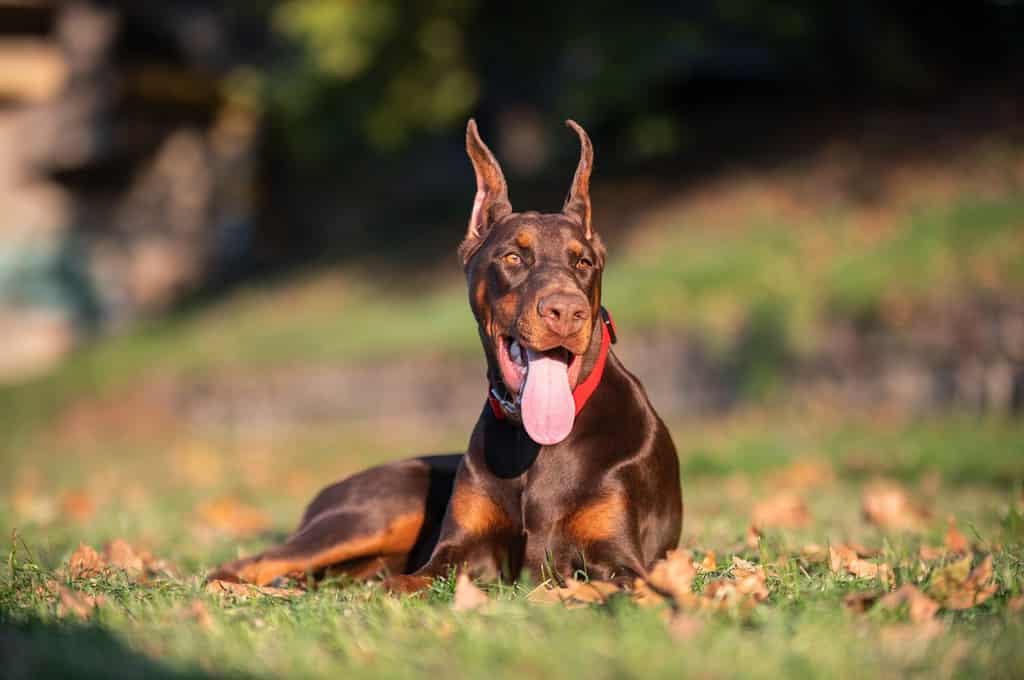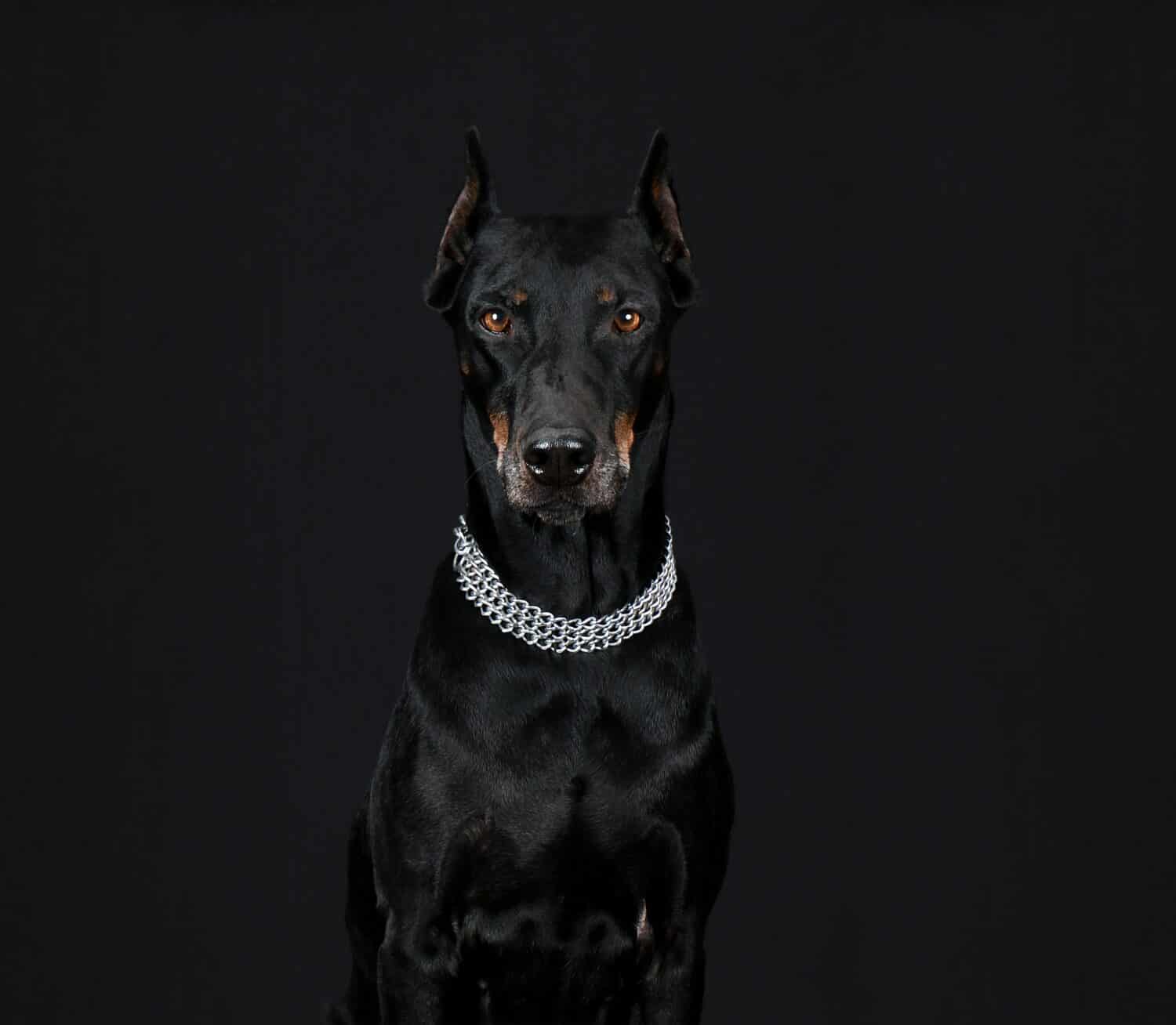Doberman Pinschers are decently intelligent dogs. They’re often ranked as smarter dogs due to their quick learning abilities and versatility. They can adapt readily to a range of different tasks and learn many different skills. But how smart are Doberman Pinschers, really?
However, these dogs are also individuals. Often, their intelligence will differ from dog to dog. Some may be smarter than others. Training, socialization, and genetics all play a role in how well their cognitive abilities play out.
Exploring the Intelligence of Doberman Pinschers
Doberman Pinschers are pretty intelligent, and we can see this intelligence play out in several different ways.
Firstly, they are known for their trainability. While being able to understand commands is a sign of intelligence, not all intelligent dogs are trainable. The dog also needs to be eager to please and listen to their owner. Luckily, the Doberman Pinscher also possesses this trait, which makes them pretty fast to learn many skills.
These dogs are also fairly good at problem—solving, which typically doesn’t involve the input of a human master. They can analyze and make decisions on their own, allowing them to function well in environments where they need to be a bit more independent.
As we’ve stated, these dogs are also very adaptable. They’re able to get used to many different environments and situations thanks to their ability to learn new skills. However, socialization helps with this trait further and is highly recommended.
Dobermans are also known for their loyalty and strong bond with their family. This family-oriented nature makes them able to read human emotions and react properly. They’re very good at picking up on human body language, which is another sign of their intelligence.
The Cognitive Capabilities of Doberman Pinschers: Understanding their Problem-Solving Skills and Brain Size

Dobermans are family companions, and they excel in canine sports and police and military work.
©Kristina Chizhmar/Shutterstock.com
Doberman pinschers are naturally good at problem-solving. They can analyze situations and make quick decisions when they need to. In many cases, this comes from their guarding background, which requires them to assess threats and deal with them independently.
Often, this skill allows them to thrive in complex environments, such as police work and search and rescue operations. They can make decisions on their own and won’t always wait on a human to make them.
These dogs are also very good at understanding human body language and emotions. Therefore, they are able to understand and respond to human-centered situations, too. They’re very people-oriented, which means that they will almost always keep the people around them in mind when making decisions.
Dobermans also have a high capacity for learning and retaining information. They can quickly learn commands and tasks, as well as routines and things that you may not directly teach them. You can utilize this intelligence to help your dog thrive in whatever situation they’re in.
That said, larger brain size isn’t necessarily linked to intelligence. Size alone doesn’t indicate how smart an animal is, and all dogs have relatively similar brain sizes compared to their bodies. These dogs don’t have a particularly large brain.
Doberman Pinscher’s Learning Aptitude: How Quick and Adaptive Are They?
Doberman Pinschers are known for their impressive learning aptitude. They’re able to adapt to new situations and learn commands at a fast speed. They’re very quick learners thanks to their intelligence and eagerness to please. These dogs are often quite receptive to training, allowing them to grasp concepts and behaviors rapidly.
Socialization is necessary to help these dogs understand that not everything is a threat. However, when socialized properly, they are quick to adapt to their environment, which is a sign of intelligence. They’re quick to pick up on changes, too, such as moving to a new home or changes in their routine. Their ability to adapt also makes them suitable for a range of different tasks.
Dobermans aren’t set on learning only one thing (or even a series of similar things). Instead, their intelligence can be applied to nearly everything. In this way, they’re able to thrive as companion dogs or military animals.
These dogs also tend to remember what they have learned for a long time.
Intelligence Ranking: Where Do Doberman Pinschers Stand Among Other Breeds?

Doberman are normally rated high in canine intelligence, but how high depends on who you ask.
©JELIZAVETA KARAKAJA/Shutterstock.com
Doberman Pinschers are generally considered to be very intelligent and rank high among other intelligent breeds. However, there is no universally agreed-upon ranking for a dog breed’s intelligence. Different dogs were bred to do different things. For instance, hounds may be very good at tracking but not good at training.
There is no way to test every breed of dog on the same skill and expect them all to respond based on their intelligence alone.
However, in Stanley Coren’s book “The Intelligence of Dogs,” he ranks breeds according to their “working intelligence.” Simply put, this is a dog’s ability to follow commands. Doberman Pinschers are labeled as above-average intelligence in this book, as they are able to learn complex tasks quickly.
Unlocking Doberman Pinscher’s Intelligence Potential: Training Techniques and Mental Stimulation
Unlocking your dog’s intelligence involves using effective training techniques and ample mental stimulation. It doesn’t matter how smart your dog is. If you don’t train them correctly, they will learn very little.
Use positive reinforcement training, which involves treats, praise, and other rewards to encourage desired behaviors. Dobermans respond well to positive feedback and are more motivated to learn when they associate training with positive experiences. They are very intelligent and will find ways to avoid training if they don’t like it.
You also have to be consistent. Consistency means that you use the same clear commands and have the same expectations. Otherwise, it can be challenging for your dog to understand exactly what you want them to do.
Early socialization is required for this breed. They need to be exposed to many different people, places, and animals from a young age so that they don’t assume everything is a threat. It also helps them become adaptable, which is a key trait we have already discussed.
You should start your Doberman where you start all dogs: basic obedience. There are just some skills that need to be learned before others, such as “sit,” “stay,” and “come.” It’s important to provide plenty of mental stimulation and build upon this basic training as soon as your dog has mastered it. Increasing the complexity of the commands slowly is key.
You can also teach your dog fun tricks. While these tricks may not have tons of real-world applications, Dobermans often love training, and you’ll eventually run out of purely practical commands to teach them.
On top of training, provide interactive toys and puzzles to help improve your dog’s problem-solving skills. These toys can help keep your dog entertained when your attention is elsewhere, too. As always, slowly increase the difficulty of these toys to keep your dog interested and entertained.
You can also train them to compete in canine sports, including agility training and scent work. Even if you never plan to actually compete in these sports, it can help keep them entertained and active. These dogs must be kept entertained, or they can become bored and destructive.
You should also keep them on a regular exercise routine. Not only does this help your canine stay healthy, but it can also help your dog’s brain. Plus, tired dogs tend to be more receptive to learning, as they have less energy.
Try to rotate between whatever activities you choose. Dogs can become bored if you continuously do the same activities over and over again.
Ready to discover the top 10 cutest dog breeds in the entire world?
How about the fastest dogs, the largest dogs and those that are -- quite frankly -- just the kindest dogs on the planet? Each day, AZ Animals sends out lists just like this to our thousands of email subscribers. And the best part? It's FREE. Join today by entering your email below.
Thank you for reading! Have some feedback for us? Contact the AZ Animals editorial team.








